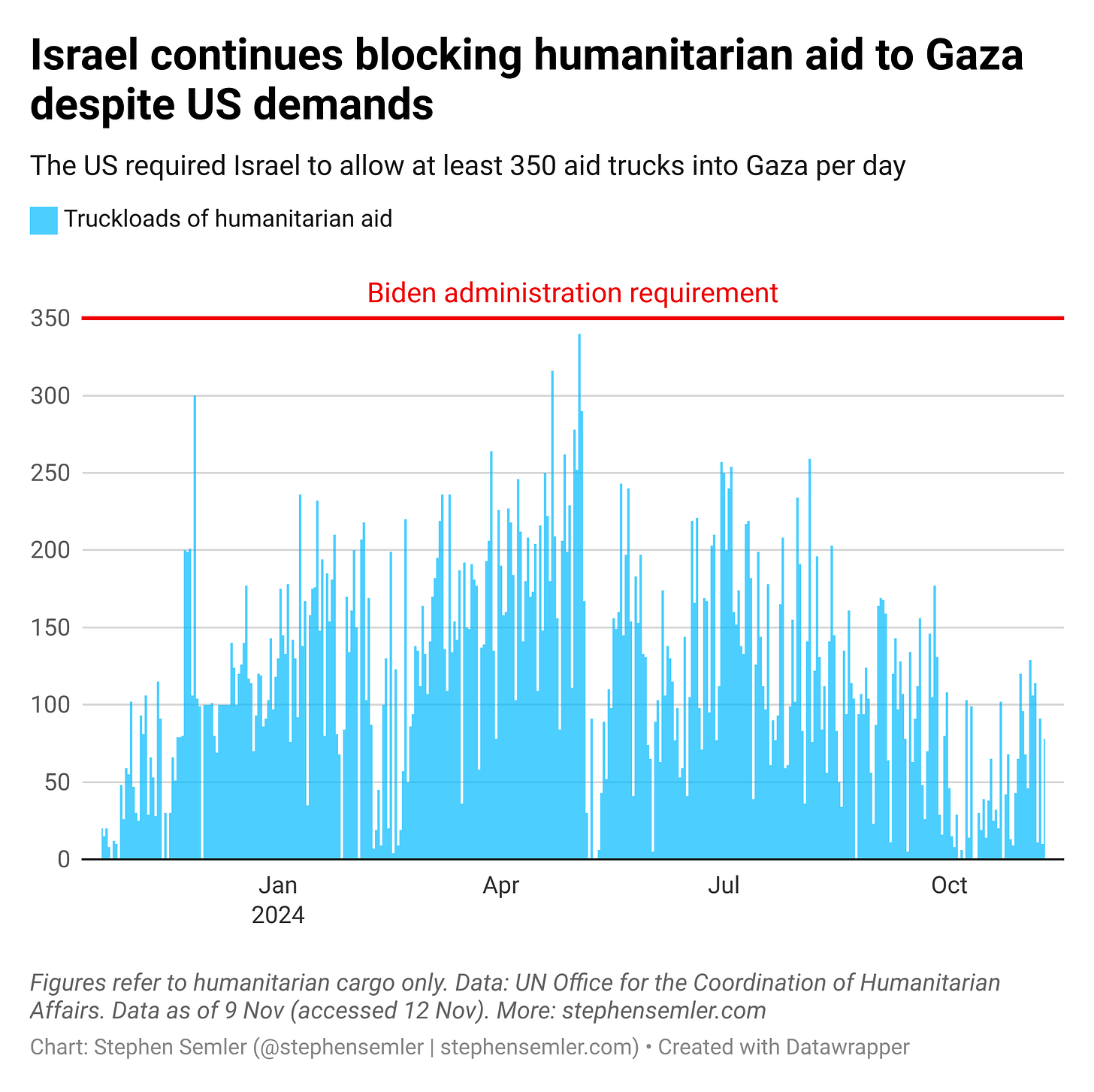Israel fails to meet US demands on Gaza humanitarian aid
Polygraph | Newsletter n°277 | 12 Nov 2024
*This is a preview of a forthcoming policy paper of mine from Security in Context (check out SIC’s work here)
Situation
Today should mark the beginning of a US arms embargo on Israel. The only legitimate counterargument to this is that one should’ve been imposed a long time ago.
Last month, the Biden administration gave Israel 30 days to improve humanitarian access in Gaza or risk losing access to American military aid under US law. The administration would evaluate Israeli compliance based on its implementation of 15 demands, but the bulk of the scrutiny would be directed at the first one — allowing 350 aid trucks to enter Gaza each day — because it’s one of the few US demands that’s quantifiable, and among the quantifiable ones, it’s the most relevant to humanitarian access. Plus it’s already a popular metric used by the government and media.
As of today, those 30 days are up. Let’s see how Israel did.
Findings
The most recent data available on truck crossings from the UN is as of November 9, so you’ll have to wait for my forthcoming paper to get the full assessment. But 27 days-worth of data is enough for the Biden administration to make a determination on Israeli compliance, based on how it said it’d evaluate their demands:
“Failure to demonstrate a sustained commitment to implementing and maintaining these measures may have implications for U.S. policy under…relevant U.S. law.” [Emphasis mine.]
In other words, if Israel hasn’t demonstrated that sustained commitment within 27 days, there’s no way it can in 30 — there’s just not enough runway left.
So did Israel demonstrate such a sustained commitment? The Biden administration ordered Israel to allow at least 350 aid trucks into Gaza each day on October 13. Since then, Israel has allowed in just 54 aid trucks per day, on average. The most it allowed into Gaza on a single day during this stretch was 129; the lowest number was zero. These numbers are subject to change — OCHA (the UN agency tracking this stuff) sometimes will increase the figures on certain days if it receives information that more aid trucks came in. But if these figures do change, it won’t be by much. IDF data as of November 10 shows that 79 trucks came in per day, on average. If UN numbers are a minimum, Israeli figures are a maximum: the IDF includes commercial cargo in its humanitarian aid count, which inflates the total (which is deliberately misleading).1
Not only has Israel failed to meet the 350-aid truck daily threshold after October 13, it also failed to meet this threshold on every single day since before October 7, 2023. And even if Israel had met this demand, it would still be able to starve Gaza because Israel’s obstruction of humanitarian aid doesn’t end at the Gaza border.
What will the Biden administration do next? A prediction: the White House will acknowledge this week that Israel failed to meet its demand but will not cut off military aid. Instead, the administration will grant Israel an extension, perhaps using the firing of Israeli Defense Minister Yoav Gallant as an excuse, or claim that Israel “showed improvement” by some arbitrary or imaginary metric. This prediction is grounded in the following reasoning: if the Biden administration was truly interested in enforcing US law — specifically, Section 620I of the Foreign Assistance Act, which is clear about prohibiting military assistance to countries that obstruct US humanitarian aid — it wouldn't have given Israel a 30-day grace period to begin with.
^Alt text for screen readers: Israel continues blocking humanitarian aid to Gaza despite US demands. The US required Israel to allow at least 350 aid trucks into Gaza per day. This chart shows the Biden administration’s requirement of 350 daily aid trucks and Israel’s failure to meet this threshold since before October 2023. Figures refer to humanitarian cargo only. Data: UN Office for the Coordination of Humanitarian Affairs. Data as of 9 November (accessed 12 November).
SPECIAL THANKS TO: Abe B., Alan F., Alex T., Andrew R., Bart B., BeepBoop, Bill S., Bob N., Brett S. Byron D., Chris G., Cperkins, David S.,* David V.,* Elizabeth R., Francis M., Frank R., Gary W., George C., Graham P., Griffin R., Hans S., Irene B., Isaac S., James H., James N., Jcowens, Jerry S., Joe R., John A., John K., Jonathan S., Joseph B., Kheng L., Lea S., Linda B., Linda H., Lindsay S.,* Lora L., Marie R., Matthew H.,* Megan., Meghan W., Michael S., Nick B., Norbert H., Omar D.,* Peter M., Philip L., Rosemary K., Silversurfer, Springseep, Theresa A., Themadking724, Tim C., [Orca Cascadia]Timbuk T., Tony L., Tony T., Victor S., Viviane A., William P.
* = founding member
-Stephen (Follow me on Instagram, Twitter, and Bluesky)
The UN tracked commercial cargo for a while but lost the ability to monitor it after May 7, due to IDF operations.





Of course there will be no restrictions on US arms to Israel. The whole point of this exercise was to make the Biden/Harris administration look like it still maintained a minimum of humanity in order to get Kamala through the election. Now that the election is over it is back to full support for Israel's extermination campaign directed at every living Palestinian in Israeli occupied territory. In addition, the US will fully support Israel's bombing of Lebanon, Syria, Yemen, and Iran whenever it feels like.
And Congress will do absolutely nothing to uphold the law.